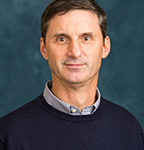 Losing your wealth can have devastating consequences.
Losing your wealth can have devastating consequences.
Carlos Mendes de Leon, professor of epidemiology at the University of Michigan, examines wealth shock and its effects on your health.
Dr. Carlos Mendes de Leon is a Professor of Epidemiology at the University of Michigan School of Public Health, where he has been a faculty member since 2011. Prior to joining the University of Michigan, he was first and Associate Professor and then a Professor of Internal Medicine (Epidemiology) and Preventive Medicine at Rush University Medical Center. From 2008-210, he served as the Director of the Rush Institute for Healthy Aging. Before joining the Rush Institute for Healthy Aging in 1995, he was an Assistant Professor of Epidemiology at the Yale University School of Public Health.
Dr. Mendes de Leon is a social epidemiologist with a primary interest in the major health problems and health disparities in late life. His work focuses on a broad array of social and psychological determinants that affect the development and progression of disability, cognitive decline and other common, age-related health outcomes. Specific areas of interest include the life-course social conditions and biological processes that affect physical and cognitive decline in older age, the role of work-related experiences in retirement timing and process and post-retirement health trajectories, and health disparities in African American and Arab American populations. He is also involved in several international collaborations, including in the Middle East, South-East Asia, and the Netherlands. He is an active member in professional organizations in the fields of gerontology, population health science, and epidemiology, and serves on the editorial board of several scientific journals in these disciplines
Wealth Shock
A sudden loss of wealth in middle or older age is not only devastating economically, but it can also have dire consequences for one’s health, and even be deadly. We investigated the question whether a large, sudden loss of wealth in middle or older age increases a person’s risk of dying. We focused the study on adults who were at least 51 years old when they experienced a sudden loss of wealth, since they have limited years remaining to regain this loss. We used data from almost 9,000 participants who were followed for up to 20 years after joining the study. Every two years, participants answered a series of questions on assets and debts that were used to calculate total wealth. About a quarter of participants experienced a negative wealth shock, and we found that this was associated with a 50% higher risk of dying compared to those who did not have such a loss of wealth. We further noted that the risk of dying among those with a negative wealth shock was almost as high as that of participants who did not have any wealth at all. The higher risk of death associated with the sudden loss of wealth did not depend on a person’s initial wealth; it was about the same among the wealthiest participants as it was among the less wealthy. Our findings offer new evidence for an important social determinant of health that so far has not been recognized: sudden loss of wealth in later middle or older age. They enrich our understanding of the critical role other social determinants such as low education, poverty, unemployment and housing instability in population health and health inequities.

Comments
One response to “Carlos Mendes de Leon, University of Michigan – Wealth Shock”
Dr. Carlos Mendes de Leon has developed a highly useful database for examining the health outcomes related to wealth and changes in it. I recall the sociology of changes in wealth leading back to Durkheim. Durkheim’s study of suicide found that people with large increases in wealth were also subject to higher suicide rates. There are a series of questions that arise from the concept that wealth changes are destabilizing one’s identity and social relationships. Loss of one’s wealth may be the most obvious, but there are many others yet to be examined. I appreciate these reports of scholarly work.